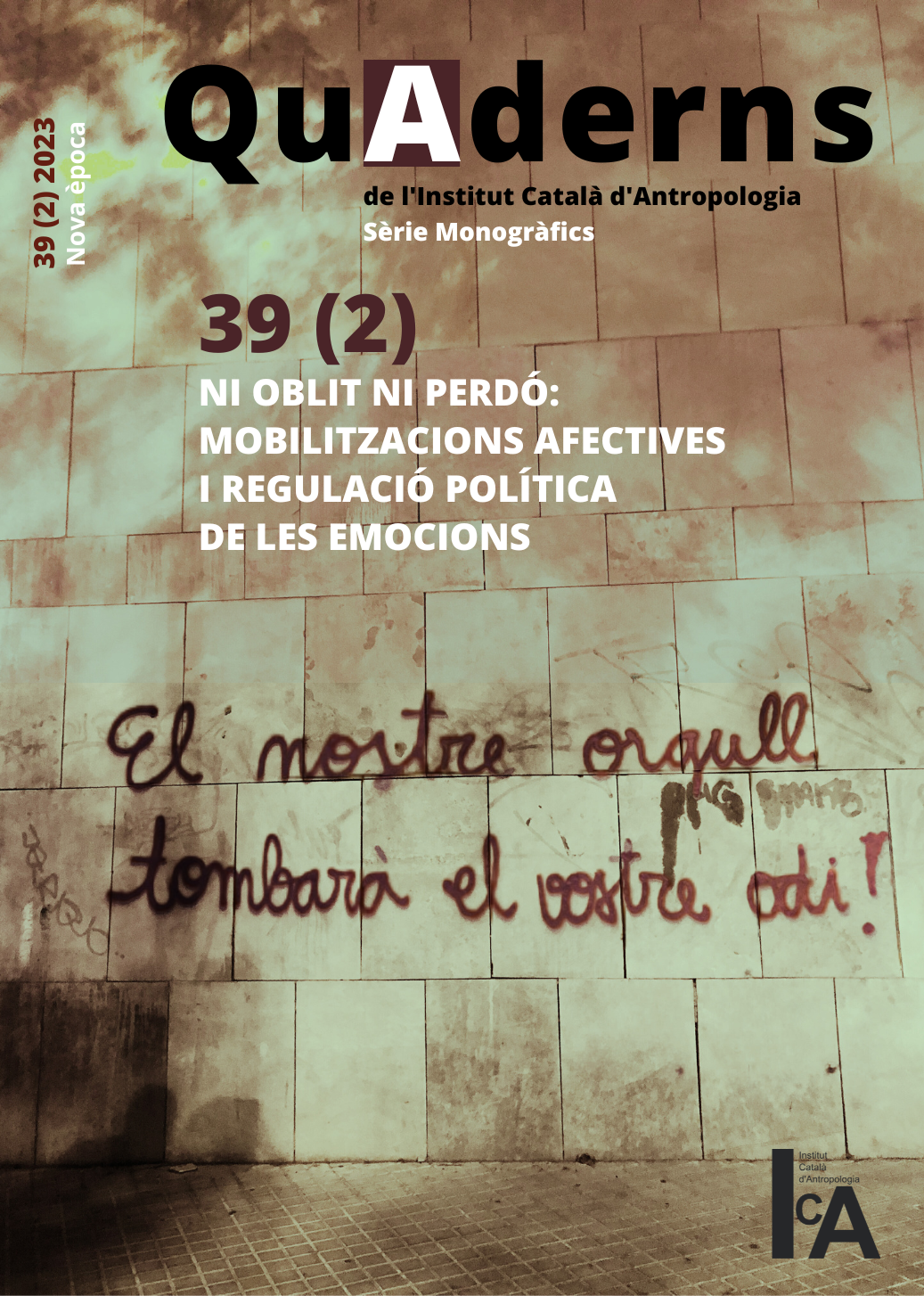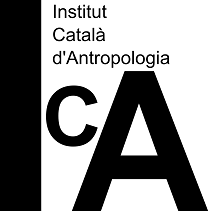Micropolítiques i tecnologies afectives a la Catalunya del Procés
DOI:
https://doi.org/10.56247/qua.496Paraules clau:
Catalunya, procés, sobiranisme, afectes, tecnologies afectives, micropolíticaResum
Més enllà de la política que s'exerceix a i des de les institucions, els individus fan servir els seus recursos de poder per mantenir o reptar estructures polítiques mitjançant micropolítiques esperonades per tecnologies afectives, tot perseguint en termes spinozistes, aquella ànima comuna a la qual s'arriba més pels afectes que no pas per la raó (Lordon, 2018, p. 233). A partir de casos empírics presos de la realitat social catalana dels darrers anys, en aquest article es reflexiona sobre la Catalunya del Procés, principalment a partir d'eines conceptuals com les nocions de micropolítica i de tecnologia afectiva, particularment indicades per explorar la política de les emocions, i que permeten incidir en un estructuralisme de les passions (Lordon, 2018) en què, en lloc de considerar antinòmiques les idees d'agència i estructura, es reconeix el joc continu que es produeix entre aquestes diferents dimensions de la realitat.
Descàrregues
Global Statistics ℹ️
|
244
Views
|
106
Downloads
|
|
350
Total
|
|
Referències
Ahmed, S. (2004). Affective Economies. Social Text 22 (2), 117-139.
Algaba, C. i E. Bellido-Pérez (2019). Memes as an ideological tool: The stance of the Spanish online newspapers regarding the Catalan Referendum and Catalan Regional Elections 2017. Catalan Journal of Communication & Cultural Studies, 11(2), 265–287.
Amin, A. i N. Thrift (2013). Arts of the Political: New Openings for the Left. Duke University Press Books.
Bandera López, N. (2019). Pluralismo político y rol del moderador en tertulias televisivas: Al Rojo Vivo y Las Mañanas de Cuatro. MHCJ, 10(1), 39-56.
Barad, K. (2007). Meeting the Universe Halfway: Quantum Physics and the Entanglement of Matter and Meaning. Duke University Press.
Bargetz, B. (2014). Mapping Affect. Challenges of (Un)timely Politics. Dins Marie Luise Angerer, Bernd Bösel i Michaela Ott (Eds.), Timing of Affect. Epistemologies, Aesthetics, Politics (pp. 289-302). Diaphanes AG.
Braidotti, R. (2013). The Posthuman. Polity.
Clua i Fainé, M. (2014). Identidad y política en Cataluña: el auge del independentismo en el nacionalismo catalán actual. Quaderns-e de l’Institut Català d’Antropologia, 19(2), 79-99.
Crozier, M. i E. Friedberg (1993). Die Zwänge kollektiven Handelns. Über Macht und Organisation. Athenäum Verlag.
Damasio, A. (2003). Looking for Spinoza. Harcourt, Inc.
Dávila, A. M. (2021). Entrevista a Jordi Cervelló. El Temps, 31.01 URL: https://www.eltemps.cat/article/12631/jordi-cervello-les-carregues-expressa-la-meva-indignacio-per-tot-el-que-va-passar-l1-o [Consulta: 27.4.2021].
Deleuze, G. i F. Guattari (1987). A Thousand Plateaus: Capitalism and Schizophrenia. University of Minnesota Press.
Demos, V. (1995). Exploring Affect: The Selected Writings of Silvan S. Tomkins. Cambridge University Press.
Dowling, A. (2019). Principal frames for interpretation of the Catalan independence challenge to Spain. Catalan Journal of Communication & Cultural Studies, 11, 303-309.
Foucault, M. (1977). Il faut défendre la société. Gallimard.
Fredengren, C. (2013). Posthumanism, the transcorporeal and biomolecular archaeology. Current Swedish Archaeology, 21, 2013.
Grossberg, L. (1992). We Gotta Get Out of This Place. Popular Conservatism and Postmodern Culture. Routledge.
Guattari, F. i S. Rolnik (1999). Micropolitica: cartografias del deseo. Traficantes de sueños.
Hannerz, U. (1997). Fluxos, fronteiras, híbridos: palavras-chave da antropologia transnacional. Mana, 3(1), 7-39. [Data consulta: 2 de desembre del 2020] https://doi.org/10.1590/S0104-93131997000100001
Hart, M. (2016). The Role of Humor in Protest Culture. Dins Kathrin Fahlenbrach, Martin Klimke y Joachim Scharloth (Eds.), Protest Cultures: A Companion (pp.98-200). Berghahn Books.
Kontturi, K.-K. (2012). Following the Flows of Process: A New Materialist Account of Contemporary Art. University of Turku.
Krause, F., V. Strang, J. Féaux de La Croix i H. Raffles (2014). Forum. What to do about ‘flow’? A conversation about a contested concept. Suomen Antropologi: Journal of the Finnish Anthropological Society, 39(2), 89-102.
Lenhardt, C. (2016). “Free Peltier now!” The use of internet memes in American Indian activism. American Indian Culture and Research Journal, 40(3), 67–84.
Lordon, F. (2018). La Sociedad de los afectos. Por un estructuralismo de las pasiones. Adriana Hidalgo editora.
Marichal, J. (2013). Political Facebook groups: Micro-activism and the digital front stage. First Monday, 18(12), 1-7.
Marks, L. (2000). The Skin of the Film: Intercultural Cinema, Embodiment, and the Senses. Duke University Press.
Martí, J. (2019). Sons i revolta a l’escenari polític català, Quaderns-e de l’Institut Català d’Antropologia, 23(2), 80-98.
Martí, J. (2020). Paisatges emocionals i identitats polaritzades a la Catalunya del Procés. Revista d'etnologia de Catalunya, 45, 105–121.
Martí, J. (2022). Noves eines conceptuals per a un món que canvia: el posthumanisme. Dins A. Vayreda i F. Núñez (Eds.), Humanisme i posthumanisme. Eines per a unes ciències humanes en moviment (pp. 67-110). UOC.
Martín Gascón, B. (2021). El léxico en el discurso feminista y antifeminista en España y Estados Unidos: un análisis cognitivo sobre “feminista” y “feminazi” en twitter. Dins G. Corpas, M. R. Bautista i C. M. Hidalgo-Ternero (Eds.), Sistemas fraseológicos en contraste: enfoques computacionales y de corpus (pp. 71-100). Comares.
Massumi, B. (1992). A User’s Guide to Capitalism and Schizophrenia: Deviations from Deleuze and Guattari. The MIT Press.
Massumi, B. (1996) The autonomy of affect. Dins P. Patton (Ed.), Deleuze: A critical reader (pp. 217–240). Basil Blackwell.
Massumi, B. (2015). The politics of affect. Polity Press.
Miller, W. (1997). The anatomy of disgust. Harvard University Press.
Morley, L. (2006). Hidden transcripts: The micropolitics of gender in Commonwealth universities. Women’s Studies International Forum, 29(6), 543-551.
Nietzsche, F. (1977). Also Sprach Zarathustra. Reclam.
Nullmeier, F., T. Pritzlaff i A. Wiesner (2003). Mikro-PolicyAnalyse. Ethnographische Politikforschung am Beispiel Hochschulpolitik. Campus Verlag.
Puar, J. (2007). Terrorist Assemblages: Homonationalism in Queer Times. Duke university press.
Puar, J. (2012) “I would rather be a cyborg than a goddess” Becoming-Intersectional in Assemblage Theory. philoSOPHIA, 2 (1), 49–66.
Quintanilla, F., J. Mariné i L. Medina. (2018). L’opinió pública catalana davant la independència i altres qüestions. Preferències i expectatives sobre el procés sobiranista. Anuari Polític de Catalunya, 12, 13-25 edició electrònica https://www.icps.cat/archivos/APC/anuari2018.pdf?noga=1
Rolnik, S. (2005). Antropofagia zombie. www.pucsp.br/nucleodesubjetividade/Textos/SUELY/Antropzombie.Pdf [Data consulta: 9.2.2022]
Rolnik, S. (2014). Micropolíticas del pensamiento, conferència impartida dins del cicle Descolonitzar la història, el coneixement, el desig, Barcelona, MACBA, 27.11.2014, https://www.youtube.com/watch?v=V73MNOob_BU
Shifman, L. (2014). Memes in Digital Culture. The MIT Press.
Thrift, N. (2007). Non-Representational Theory: Space, Politics, Affect. Routledge.
Widder, N. (2012). Political Theory after Deleuze. Continuum.
Wiggins, B. E. (2019). The Discursive Power of Memes in Digital Culture: Ideology, Semiotics, and Intertextuality.Routledge.
Willner, R. (2011). Micro-Politics: An Underestimated Field of Qualitative Research in Political Science. German policy studies, 7, 155-185.
Wuth, M. (2019). Affektive Netze. Politische Partizipation mit Spinoza. Dins Rainer Mühlhoff, Anja Breljak i Jan Slaby (Eds.), Affekt Macht Netz (pp. 269-290).Transcript Verlag.
Descàrregues
Publicades
Com citar
Número
Secció
Llicència
(CC BY-NC-SA 4.0)




